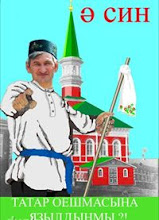
In the middle of the 5 th. century after the death of Atilla, the Great Hun Empire began to disintegrate into several Turkic Kingdoms among them in the 7 th. century the Kingdom of Great Bulgaria.This kingdom was short lived and upon the death of its ruler Kubrat Han they splintered into two nations, one under the khan's younger son Asparuh Han moved to what is now known as Bulgaria, associated with the Slavic Tribes and established the Bulgarian Kingdom in 681 AD. The other under the two elder sons Batbay and Kutrag intermingling with Khazar and Alan tribes remained in the Eastern part of the European Plains.A portion of these in the 8 th. century moved to what is now Tatarstan/Bashkirtistan associating themselves with other Turkic and Ugro-Finnic Tribes established the feudal Bulgar State in the IX-X Century. The state traded with Central Asia & China. On June 16?, 922AD the Bulgars converted to Islam and the old Turkic Script was replaced by the Arabic Alphabet. The inhabitants were talented in artisanship,agriculture and commerce and had great ability in forming cities. In 1236AD Bulgar was conquered by the Mongolian Batu Khan and became part of the Golden Horde. However it did not lose entirely its independence, resurrected its economy and culture and was first in the moulding of cast iron. The weakening of Bulgar Khanate due to intense fights for leadership prompted many to move west to the more tranquil area of Kazan and in the 1430-40's after the fall of the Golden Horde several Tatar States were formed consisting of the Kazan, Crimean, Kasym, Sibirean and Astrakhan Khanates and these were further complimented by Mari-Udmurts, Kipchaks and Nogais. The XV and the first half of the XVI centuries saw the growth of the Kazan Khanate, also known as Bulgars or Tatars (named for Turkic Tribes forced to fight in the forefront of Genghis Khan's armies)[Historian Ravil Fahretdinov in Azat Hatun, July 84]. Tatar History Suyum bike Tower the symbol of Tatarstan built by Queen Suyumbike over the grave of her husband Safa Girey(Has a lean of 194 cms). Kazan fell to Ivan the Terrible forces in Oct. 14, 1552. 1593 Tsar Feodor Ivanovich orders the destruction of all Mosques in Kazan Land. 1708 Kazan Province established by Peter 1 1766 Catherine the Great rescinded the law on building mosques. At the end of the last and early part of this century saw the awakening of the long dormant national identity, progressive religious outlook, emphasis on modern education, increase in publication and general political activity. With the collapse of the Russian Empire in 1917 and during the early stages of the Communist Revolution, Lenin encouraged among the Muslims, religious freedom and national identity-albeit within the Communist framework., Tatarstan together with Bashkirtistan and part of the present day Orenburg oblast took advantage and in a combined National Assembly(Mejlis) on November 19, 1917 formed the Idil-Ural State that encompassed 220,000 sq. kms of what is now Tatarstan and Bashkirtistan. This was met with violent opposition of both Lenin and Stalin. To prevent this brotherly unity the Soviets first in March 23, 1919 formed the Bashkir Autonomous Republic and subsequently on May 27, 1920 the Tatar Autonomous Soviet Socialist Republic arresting the participants and redrawing or as per Soviet Media "rounding off" the natural borders to the benefit of the Russian Oblasts(Provinces). With this surgical move 75% of the Tatar population found itself living outside the borders of Tatarstan. 1920's Mass purges eliminated all members of the Tatar Government and the greater part of the inteligentia. Intermittent bloody purges continued until the death of Stalin while systematic Russification continued unabated until the end of the Brejnev era. The economic repression and the building of industrial complexes such as Magnitogorsk forced Tatars to leave their homeland, the void was filled by Russians, Ukrainians and others in the building of the Kamaz Auto Complex. Tatar Parliament unanimously declared Tatarstan's Sovereignty on Aug.30, 1990. April 1991 Tatar Parliament asserted the supremacy of Tatar legislation over Russian where the two were in conflict. March 21, 1992 in a Referendum on Tatarstan's sovereignty, witnessed by International observers, with 81.6 of eligible voters voting was approved by a margin of 61.4 percent to 37.2 percent of the eligible voters.



